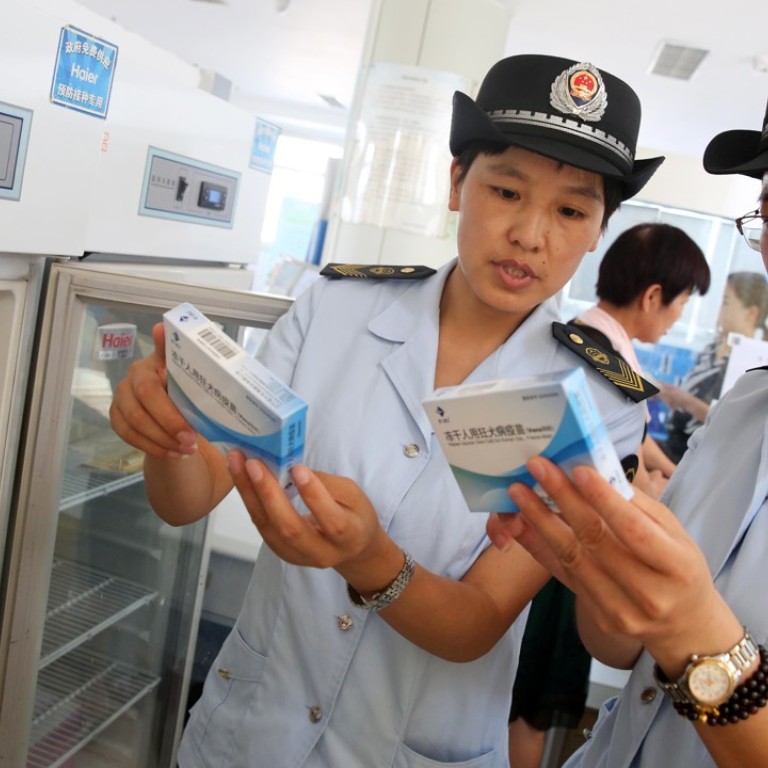
China censors social media posts about vaccine scandal, monitor says, as tabloid suggests issue has been overblown
The Chinese word for ‘vaccine’ is among most restricted on Weibo, according to an online censorship project run by University of Hong Kong
President Xi Jinping might have described China’s latest vaccine scandal as “appalling”, but censors are still keeping a close eye on social media users who vent their spleens on the subject, while state media has accused some groups of overblowing the issue and the government has reportedly banned coverage of the vaccines from Tuesday onwards.
According to a project run by the Journalism and Media Studies Centre at the University of Hong Kong, which monitors censorship on Weibo, China’s Twitter-like service, the Chinese word for “vaccine” was one of the most restricted on Sunday and Monday.
Fu King-wa, an assistant professor who heads the project, known as Weiboscope, said also that the rate at which posts related to the scandal were being screened peaked on Sunday. For every 10,000 posts made across the 120,000 accounts monitored, an average of 63 were blocked, he said.
Chinese President Xi Jinping orders crackdown over ‘appalling’ vaccine scandal
One post that was removed by the censors said: “People from the drug and vaccine regulator should resign immediately, this is shameful!”
Another that disappeared said: “When everyone in the country is rushing to get milk powder and vaccines elsewhere … more people will understand why Hong Kong and Macau are rejecting the [mainland] system.”
Despite the deletions, Fu said the government had not completely blocked discussion of the scandal, which concerns the production of substandard DPT (diphtheria, pertussis – also known as whooping cough – and tetanus) vaccines by Chinese company Changsheng Bio-technology.
Because there was such a huge number of posts on the subject, the government “basically allows people to mention the incident or circulate information about it, including references to official media posts”, he said.
As new vaccine scandal grips China, parents say they’ve lost faith in the system
However, Fu said that according to figures from Weiboscope, which monitors selected microbloggers who have more than 1,000 followers or whose posts are frequently censored, the current level of censorship was higher for the current scandal than it was in 2016 for a similar incident involving unsafe vaccines that left four people dead.
On that occasion, just 53 messages were deleted for every 10,000 posts made, he said.
Restrictions also appear to have been imposed on print media. A reporter from Shenzhen Media Group told the South China Morning Post that the relevant authorities had issued an order banning the coverage of the vaccine scandal from Tuesday.
China’s state media has toned down its reporting of the incident after publishing Xi’s comments made during his ongoing trip to Africa, and a statement made by Premier Li Keqiang late on Saturday night.
Li said that a “moral bottom line” had been crossed and promised “severe punishment would be meted to all who [violated the safety standards]”, according to a report by state broadcaster CCTV.
That, however, was not the first time Li had vowed to clean up the vaccine industry. He made much the same pledge more than two years ago in response to a similar scandal.
China’s vaccination system has been tainted by corruption, weak regulations and staff shortages
Meanwhile, Hu Xijin, editor-in-chief of the Chinese tabloid Global Times, accused some social media users of exploiting the scandal to criticise the country.
“Many people feel unrest about the vaccine incident … but there is also a small number who are trying to break down the positive impacts of how the government is trying to deal with it,” he wrote on Weibo.
“The vaccine incident has made people anxious and angry, but the whole country is not as bad as how a small group of people are passionately promoting it to be.”
Changsheng Bio-tech, the vaccine maker behind China’s latest public health scare
According to the Jilin Food and Drug Administration, where Changsheng Bio-technology is based, the company sold about 252,600 substandard DPT vaccines to the Shandong Centre for Disease Control and Prevention, the agency in charge of public health in a province of about 100 million people. The drugs were administered to children as young as three months old.

